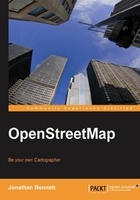
The OpenStreetMap Foundation (OSMF) is a non-profit company based in the UK that supports the project. The foundation exists to own the project's infrastructure, accept donations, organize the annual conference, and provide arbitration in the event of disputes. It was established in 2006 as a Company Limited by Guarantee—a type of company in the UK that is suited to non-profit-making organizations. This type of company doesn't have shareholders; rather its members or guarantors are expected to pay a small amount (currently £5) in the event of the company becoming insolvent. The foundation's Memorandum of Association forbids it from paying dividends or otherwise distributing any profits.
Anyone may join the OSMF, although it's not necessary to use OpenStreetMap or contribute towards it. Neither does the OSMF dictate what can or can't be mapped, or how mappers work. Although it owns the project's infrastructure, the foundation doesn't own the data stored on them unless mappers have explicitly chosen to reassign the copyright on their contributions to the foundation.
The OSMF is governed by a board of directors, elected by the membership, which oversees the general running of the foundation. There are also a number of working groups made up of members of the foundation in addition to board members, which provide recommendations about particular aspects of the project, such as licensing, promotion of the project, the annual conference, and a data working group, responsible for ensuring the accuracy of the data as a whole. The data working group will intervene if unresolvable content disputes occur, or for cases of persistent vandalism, but, in general, most issues are solved by the OpenStreetMap community.
The foundation also administers the GPStogo,scheme, which provides GPS receivers to mappers in developing countries. The scheme is aimed at improving OpenStreetMap's data in countries where the equipment needed is too expensive to buy by lending receivers to mappers who have already made some contribution to the project.